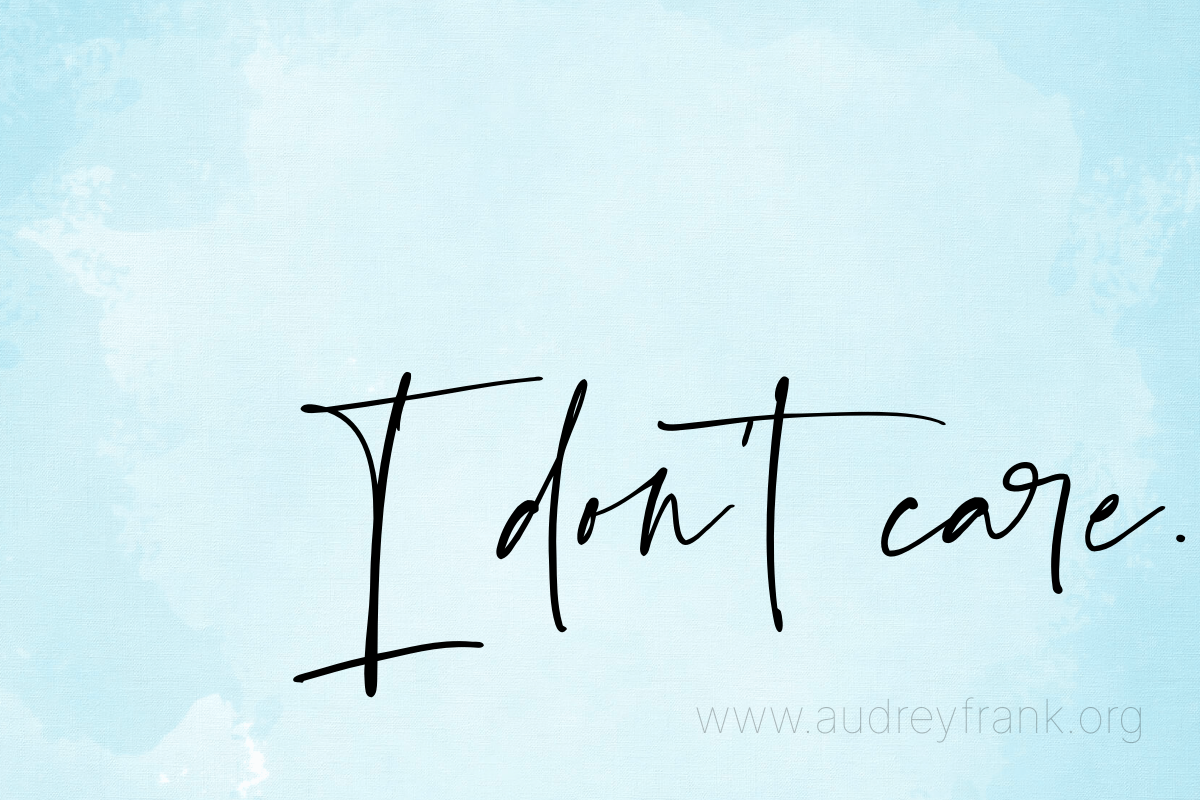I Don’t Care

For Pastor Dave, with gratitude
And all of you, clothe yourselves with humility toward one another, because God opposes the proud but gives grace to the humble. And God will exalt you in due time, if you humble yourselves under his mighty hand by casting all your cares on him because he cares for you.
1 Peter 5:5-7, NET
I don’t care.
This sentence brings to my lively mind a clear picture of a stubborn child, arms crossed, refusing to obey.
Or a weary ministry leader beleaguered by too much caring and not receiving enough care in return.
The child only cares about what he wants; the adult is desperately drawing boundaries to self-protect from any more pain in the challenging task of so much caring for others.
Caring is problematic.
Care only about yourself, and the world falls down around you. Care only about others, and the world inside you falls down. Cares for the world, cares for ourselves, cares can choke our souls.
Is there a better way to care?
I wonder if I don’t care is the banner phrase for what Ignatius called indifference, or “the capacity to let go of what doesn’t help me love God or love others—while staying engaged with what does.”
Author Larry Warner, in his paper “Indifference (Detachment): God’s Spiritual Superfood for our Souls,” calls indifference a kind of healthy detachment, described as “a means of spiritual freedom that enables the person to be free from anything that would exert authority over an individual to such a degree that they would be incapable of choosing to say yes to God and God’s purpose for his life. Indifference frees us to be able to say in every situation not my will but God’s will be done.”
Cares don’t free us; they bind us. Indifference frees us to want only one thing: God’s will. What if a child responded to her Father’s instruction with a healthy detachment from her own cares and concerns and only wanted what He desired?
What if a weary ministry leader could say yes to Jesus’ admonition “feed my sheep” without attachment to the need to receive affirmation and care in return? How might it transform his yes’s and no’s in the first place, creating a new, restful rhythm of caring and being cared for?
These may sound to some like ideals spoken into in a painful battleground of bombed-out hopes amidst stubborn edifices of self and pride.
Yet Peter, the one to whom Jesus spoke those audible words, “feed my sheep,” believed a state of holy carelessness was possible.
I wonder if indifference is crucial to humility. Peter invites to pause and peer deep, to consider the relationship between a holy I don’t care and hallowed humility.
And all of you, clothe yourselves with humility toward one another, because God opposes the proud but gives grace to the humble. And God will exalt you in due time, if you humble yourselves under his mighty hand by casting all your cares on him because he cares for you.
1 Peter 5:5-7, NET
This wee passage is jam-packed with all the elements of care gone wrong and care redeemed.
Care redeemed is care cast on the Lord. Casting our cares on Him is an act of trust. #indifference Share on XWe heave and fling and throw our cares on Him with all our might and in the process, leave the results to Him.
He does care, so I don’t have to be filled with care. We can now approach one another detached from our ravenous cares, indifferent to them because we cast them on the One who cares for us. Now, we make what He cares about our chief concern. He’ll take care of the rest.
Suddenly, we are seeing clearly. From this humble position, we can see God’s will.
Lord, it seems so strange that bringing my cares to You is a way to humility. But what fills me must be emptied. You emptied yourself on the cross for me. Now I empty myself of all my cares at the foot of that cross and trust You. Amen.

No Comments